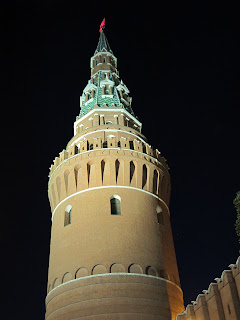Location: Rostov-on-Don, Russia
Local Time: 11:19 PM - Getting better!
Madison Time: 2:19 PM
 |
| A field being plowed in western Rostov - the age of some of the equipment being used is strikingly older in Rostov than in Wisconsin. |
Здравствуйте! (Zrasdt-vwee-tye, or, Hello!) Since the last time I've written, Sasha and I have made a lot of progress in terms of our interviews with wheat growers and other wheat industry experts. We have had a very colorful experience along the way - one peppered with bureaucracy, extreme generosity, concern that I'm a spy, interesting conversations, and lots and lots of black tea, instant coffee, and feral dogs. I'm quickly learning that Russia is a country of surprising contrasts.
Much of our first day in Rostov was spent at the local Ministry of Agriculture attempting (unsuccessfully) to set up a meeting to learn about policies and trends relevant to wheat production in the region. Given the amount of energy that Sasha put forth trying to schedule this meeting, this rejection was our first real disappointment of the trip.
So, we had to pick ourselves up, dust ourselves off, and say, onward and upward! We had a meeting the next day scheduled with
Prof. Nikolai Zelensky, Dean of the Agronomy Department at Don State Agrarian University - the main agricultural university in the Rostov - who specializes in improving the efficiency of agricultural systems through intercropping. What was scheduled to be an hour long meeting turned into a 3 hour long discussion of winter wheat production in Rostov. He provided a wealth of information on production trends and practices in the region. It was interesting to learn about the very different and more reluctant relationship between between the university and crop producers relative to Wisconsin, where the university is a major disseminator of information used by farmers. The meeting left Sasha and me curious to learn more about the ability and interest of farmers in adopting new technologies and the potential impact on productivity, something that we will continue to investigate.
Today, we had our first meeting with a wheat producer in Rostov. We traveled about an hour east of the city center to meet with a manager and an agronomist of an agriholding enterprise - one of the three types of farms in Russia (the other two being "private peasant" and "private household" farms). "Agriholding" is term that encapsulates a number of different types of companies. The unclear
definition reflects a land tenure system that is still evolving following the collapse of the Soviet Union. However, more often than not it refers to a private company that rents fields to grow crops.
It was exciting to finally hear from the manager and agronomist what is happening on the ground - what yields the company is achieving, what management practices they are using, and what constraints they are facing. Data!
 |
| A field most recently used to grow wheat in the Bagaevsky District of Rostov. |
|
|
|
|
After the meeting, we stopped off to take pictures of a beautiful cathedral in the middle of the little rural town of Manychskaya.
 |
| Welcome to Manychskaya. Established in 1593. |
|
|
 |
| Manychskaya Cathedral in background. Former base of a statue of Lenin in the foreground that was torn down after the collapse of the Soviet Union. |
While walking around the grounds, we struck up a conversation with three men who worked for the church and its orphanage. They invited us for tea, and as with the professor, what was supposed to be a short visit turned into a three hour visit, complete with a guided tour of the convergence of the Don and Manych Rivers...
... more tea and a lunch prepared from the local potatoes and tomatoes from the region...
 |
| Our gracious hostess, Olga |
... and a chance to try the well water that has been claimed to perform miracles. The kids were very excited to meet someone from America and to hear English spoken. Like a good Wisconsinite, I taught them to say "cheese!" when we took a group picture...
Their generosity was incredible and made for a fantastic ending to our first excursion into the Russian countryside. Tomorrow we will meet with an agricultural economist, and Friday we have our second trip into the field to meet with another wheat producer. Until next time!























